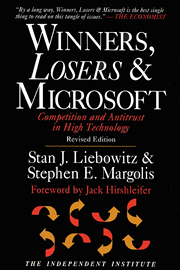The New York Times reports on a fascinating new exercise regimen: The Scientific 7-Minute Workout.
How can you get all that done in just seven minutes? Well, first, the routine consists of twelve intense 30-second exercises (12 exercises x 30 seconds/exercise = six minutes). Then we have to add a 10-second rest period between each exercise (11 rest periods x 10 seconds / period = 1 minute, 50 seconds).
Let’s see, so the 7-minute workout consists of six minutes of exercise and 1:50 worth of breaks… Don’t mess with science, I guess.



 Mark Montgomery and Irene “Tinker” Powell will be on campus this week to deliver the next Economics Colloquium address, “Baby Markets: Thinking the Unthinkable in International Adoption.” The talk is Thursday at 4:30 in Steitz 102. This is quite a topic, where the rules of the game have pretty significant distributional consequences, and it will be interesting to see how this sorts out.
Mark Montgomery and Irene “Tinker” Powell will be on campus this week to deliver the next Economics Colloquium address, “Baby Markets: Thinking the Unthinkable in International Adoption.” The talk is Thursday at 4:30 in Steitz 102. This is quite a topic, where the rules of the game have pretty significant distributional consequences, and it will be interesting to see how this sorts out. One of my favorite Lawrence alums, Eric Schacht (’89), is featured on the LU website for winning the Stanley Malles Award for distinguished community service.
One of my favorite Lawrence alums, Eric Schacht (’89), is featured on the LU website for winning the Stanley Malles Award for distinguished community service.